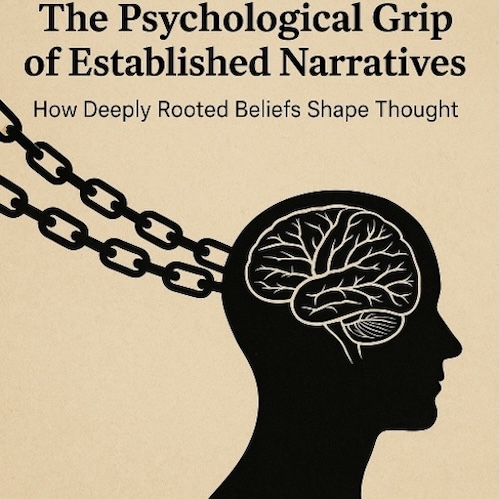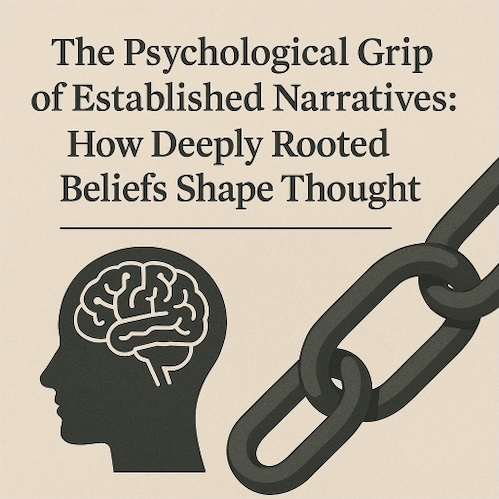Psychology of Fear Stops Progress: How to Overcome It?
Psychology of Fear Stops Progress, as fear stands as one of the most formidable psychological obstacles to progress, preventing individuals, communities, and even entire nations from embracing transformation. Real-world examples reveal how fear has stifled innovation, suppressed independent thought, and led to the decline of vast regions, leaving societies trapped in cycles of stagnation. Whether rooted in uncertainty, misinformation, or deeply ingrained societal conditioning, fear can immobilize decision-making and reinforce outdated systems. Overcoming this challenge requires awareness, resilience, and the courage to question dominant narratives. By identifying and dismantling fear-driven limitations, individuals and societies can reclaim their ability to evolve, innovate, and shape a future unbound by unnecessary restrictions.
 Psychology of Fear Stops Progress = Grip of Established Narratives = How Psychological Mechanisms Preserve Traditional Narratives in a Changing World?: How to Overcome It? = An abstract representation of a human mind entangled in roots, symbolizing deeply rooted beliefs and narratives shaping thought. The image should convey a sense of mental struggle and entrapment, with a subtle glow of enlightenment breaking through.
Psychology of Fear Stops Progress = Grip of Established Narratives = How Psychological Mechanisms Preserve Traditional Narratives in a Changing World?: How to Overcome It? = An abstract representation of a human mind entangled in roots, symbolizing deeply rooted beliefs and narratives shaping thought. The image should convey a sense of mental struggle and entrapment, with a subtle glow of enlightenment breaking through.While exploring Psychological Fear Stops Progress, you will also uncover deep psychological insights I've gained over many years while working to motivate the public in various societies. This exploration of psychological fear is rooted in lifetime experiences, examining its role and offering solutions to shape society for the better.
Here’s a preview of the experiences that will provide deeper context before reading the full articles below:
- How Fear Devastated an Entire Country? (Part #1)
- Sudan as a Modern Case Study of Fear-Driven Collapse! (Part #2)
- Fear and Collective Behavior: How Dogma, Nostalgia, and Religion Shaped Sudan’s Destiny? (Part #3)
- Reimagining Progress: How to Overcome Fear on Personal and Collective Levels? (Part #4)
- The Anatomy of Fear: Lessons from Sudan and the Psychology of Change! (Part #5)
These experiences will help you see the patterns of fear-driven stagnation and the paths toward meaningful progress. You can explore every title here and in the list below on the sections of the Global Dynamics.
Understanding the Historical Connection of the Psychology of Fear!
I began this research by tracing historical eras from the pre-Cold War period to the present, analyzing their shortcomings in economics, the environment, health, politics, and society. Through this process, I uncovered critical issues within conventional narratives. The findings of this extensive study are documented across more than 30 pages, detailing the inherited flaws in economics, ideologies, and geopolitics. Below, you will find titles referencing these sections, which can be explored further within the Global Dynamics segment, located just beyond the essential content of the page.
- Why Expanding Horn Africa to Include Other States and Global Impacts?
- A New Era of Chaos and Distrust is Shaping!
- Pre-Cold War Era of Colonialism & Imperial Rivalries!
- Pre-Cold War American Expansionism!
- The Cold War Era: A Battle of Ideologies and Influence!
- Why Do Nations Fragment When Unity is Their Greatest Strength?
- Eastern Europe Socialist Bloc Fragmentation!
- Sudan and U.S. Policy: A Terrorism Connection? What's The Real Story?
- Eritrea Was Too Late to Independence Due to Colonial Conspiracies!
- Namibian Road to Independence From Liberation to Sovereignty!
- The Post-Cold War Era: A Shifting Global Landscape!
- How Economics, Ideology, and Geopolitics Fragment Nations and Create New Ones?
- New World Order: Stability or Chaos?
- Why Am I Saying A New Era of Disorder and Doubts is Shaping?
- Rewriting History: The Lies We Inherit!
- Illusion of Institutional Narratives!
- Why Prevailing Perspectives Fail Us?
- Conventional Narratives Are Always Wrong!
- Rewriting History: The Lies We Inherit!
- How Established Opinions Shape Perception?
- Established Frameworks Invisible Forces!
- Dominant Perspectives Shape Our World!
- Mainstream Ideologies Shape History!
- Origins of Misleading Narratives!
- Breaking the Illusion of Truth: Psychological Liberation & Intellectual Growth!
- Social Norms Shape Consumer Behavior!
- Media Driven Fear Narratives!
- Psychology of Fear Stops Progress!
The Psychological Grip of Established Narratives: How Deeply Rooted Beliefs Shape Thought?
Throughout history, dominant narratives have shaped societies, influencing how individuals perceive reality, interpret events, and make decisions. These narratives, often reinforced through cultural traditions, authority figures, and collective memory, create a psychological grip that makes them difficult to challenge, even when evidence contradicts them. Understanding how these narratives take hold and persist is essential for fostering independent thought and intellectual freedom.
How Established Narratives Take Hold?
1. Cognitive Conditioning: The Power of Repetition
- Repeated exposure to a narrative strengthens belief, making it feel like an unquestionable truth.
- Societies reinforce dominant perspectives through education, media, and cultural storytelling.
- Over time, individuals internalize these ideas, often without critically examining their validity.
2. Emotional Attachment: The Comfort of Familiarity
- People develop emotional bonds with established narratives, associating them with identity and stability.
- Challenging these beliefs can feel like a personal attack, leading to defensive reactions.
- Fear of uncertainty often drives individuals to cling to familiar perspectives, even when they limit progress.
3. Social Reinforcement: The Pressure to Conform
- Societal norms discourage questioning dominant narratives, reinforcing collective acceptance.
- Dissenters may face social exclusion, criticism, or even institutional pushback.
- Groupthink ensures that alternative viewpoints struggle to gain traction.
The Consequences of Unquestioned Narratives
- Stagnation in Thought: When narratives remain unchallenged, intellectual progress slows, preventing new ideas from emerging.
- Resistance to Change: Societies that rigidly adhere to established perspectives struggle to adapt to evolving realities.
- Manipulation & Control: Those in power can exploit dominant narratives to maintain authority and suppress dissent.
Breaking Free from the Psychological Grip
1. Encouraging Critical Thinking
- Questioning long-held beliefs fosters intellectual independence.
- Analyzing historical context helps uncover biases within dominant narratives.
2. Diversifying Perspectives
- Exposure to alternative viewpoints challenges ingrained assumptions.
- Engaging with different cultures, philosophies, and disciplines broadens understanding.
3. Creating Open Dialogue
- Safe spaces for discussion allow individuals to explore ideas without fear of judgment.
- Encouraging debate helps dismantle rigid thought patterns.
The psychological grip of established narratives is powerful, shaping how individuals and societies interpret the world. While these narratives provide structure and continuity, they can also limit progress when left unchallenged. Recognizing their influence is the first step toward intellectual freedom, allowing individuals to think critically, embrace change, and shape a future based on truth rather than tradition.
Defending Tradition: How Psychological Mechanisms Preserve Traditional Narratives in a Changing World?
Throughout history, societies have evolved, challenging long-standing traditions and beliefs. However, conservative resistance to change is often reinforced by psychological defense mechanisms that protect established norms, even when they lack factual basis.
These mechanisms serve as tools of ideological preservation, ensuring that conventional narratives remain dominant despite societal progress. Understanding them is crucial for recognizing how resistance to change is psychologically reinforced.
1. Selective Memory: Romanticizing the Past to Justify Tradition
One of the strongest psychological defenses is "nostalgia bias", where individuals selectively remember the past as superior to the present. This mechanism filters out inconvenient truths, reinforcing the idea that traditional values must be preserved.
How It Preserves Conventional Narratives?:
- Idealizing past eras while ignoring historical injustices.
- Dismissing modern advancements as threats to tradition.
- Using nostalgia as a weapon to resist progressive change.
Example: Arguments like Society was better when families followed traditional roles ignore the systemic inequalities that existed in those eras.
2. Moral Absolutism: Framing Change as a Threat to Ethics
Many conservatives rely on moral absolutism, believing that their traditional values represent unchanging moral truths. This defense mechanism rejects nuance, portraying progressive ideas as inherently immoral.
How It Preserves Conventional Narratives?:
- Labeling new ideas as "corrupt" or "dangerous."
- Using religious or cultural authority to justify resistance.
- Framing tradition as the only moral path.
Example: Opposition to LGBTQ+ rights is often justified by claiming that traditional family structures are "morally superior," ignoring the evolving understanding of human identity.
3. Fear-Based Resistance: The Psychology of "Slippery Slope" Thinking
Fear is a powerful motivator in conservative resistance to change. The slippery slope fallacy suggests that accepting one change will lead to catastrophic consequences, reinforcing the need to maintain the status quo.
How It Preserves Conventional Narratives?:
- Exaggerating the impact of social change (e.g., "If we allow this, society will collapse").
- Using fear to discourage questioning of tradition.
- Creating worst-case scenarios to justify resistance.
Example: Claims that legalizing same-sex marriage would "destroy traditional families" rely on fear rather than factual evidence.
4. Group Identity and Tribalism: Loyalty Over Logic
Conservative resistance is often reinforced by group identity, where individuals prioritize loyalty to their ideological community over objective truth. This mechanism discourages independent thought and punishes dissent.
How It Preserves Conventional Narratives?:
- Rejecting outsiders who challenge tradition.
- Valuing loyalty over factual accuracy.
- Using social pressure to maintain ideological conformity.
Example: Political figures who question traditional policies may be ostracized by their own party, reinforcing group loyalty over intellectual honesty.
5. Authoritarian Deference: Trusting Tradition Over Evidence
Many conservatives rely on authoritarian deference, where they trust traditional leaders, religious figures, or historical authorities over factual analysis. This mechanism reinforces hierarchy and discourages questioning.
How It Preserves Conventional Narratives?:
- Believing authority figures without scrutiny.
- Rejecting scientific or academic findings that contradict tradition.
- Using historical figures as unquestionable role models.
Example: Resistance to climate change policies often stems from trust in conservative leaders who dismiss scientific consensus.
6. Psychological Projection: Blaming Progressives for Social Decline
Projection is a defense mechanism where individuals attribute their own fears and biases to others. In conservative resistance, this often manifests as blaming progressives for societal problems rather than examining traditional flaws.
How It Preserves Conventional Narratives?:
- Accusing progressives of "destroying values" while ignoring systemic issues.
- Framing social change as an attack on tradition.
- Dismissing criticism of conservative policies as "radical" or "dangerous."
Example: Economic struggles may be blamed on progressive policies, even when conservative economic models contributed to inequality.
7. Combating Psychological Resistance: Encouraging Open Dialogue
To challenge these defense mechanisms, society must foster critical thinking, open discourse, and factual analysis.
Strategies for Breaking Conventional Resistance:
- Encouraging historical accuracy over nostalgia bias.
- Promoting ethical discussions beyond moral absolutism.
- Using evidence-based reasoning to counter fear-based narratives.
- Creating safe spaces for ideological questioning without social punishment.
True progress requires intellectual courage... the willingness to challenge deeply ingrained beliefs.
The Balance Between Tradition and Evolution
While psychological defense mechanisms help conservatives preserve conventional narratives, they can also hinder societal progress*. Recognizing these mechanisms allows for constructive dialogue, ensuring that tradition evolves alongside truth.
Change is inevitable, but understanding why people resist it, is the first step toward meaningful progress.
Fear and Forward Motion: The Tug-of-War Between Anxiety and Advancement!
Progress is often seen as a natural force... an inevitable march toward innovation, discovery, and societal evolution. Yet, beneath every major leap forward lies an invisible struggle: the tension between fear and advancement. Whether on an individual level or within entire civilizations, anxiety frequently acts as a counterweight to progress, slowing momentum and reinforcing hesitation. Understanding this psychological tug-of-war is essential for overcoming barriers and embracing forward motion.
The Psychological Roots of Fear in Progress
Fear is deeply ingrained in human psychology, serving as both a survival mechanism and a mental roadblock. While it protects us from danger, it also fosters resistance to change, making the unknown feel threatening rather than promising. Several psychological factors contribute to this hesitation:
- Loss Aversion: People fear losing stability more than they desire potential gains, making them reluctant to embrace new ideas or drastic shifts.
- Uncertainty Paralysis: The unpredictability of change can trigger anxiety, leading individuals and societies to cling to familiar structures.
- Cognitive Overload: When faced with too many choices or complex transformations, the brain defaults to avoidance, preferring the comfort of routine.
Historical Patterns: Fear vs. Innovation
Throughout history, fear has delayed progress, yet it has never fully stopped it. Some of the most transformative advancements faced intense resistance before becoming widely accepted:
- Industrial Revolution: Many feared that mechanization would destroy jobs and destabilize economies, yet it ultimately led to unprecedented growth.
- Scientific Discoveries: Galileo’s heliocentric model was condemned before reshaping our understanding of the universe.
- Technological Breakthroughs: The internet was once viewed with skepticism, yet it has revolutionized global communication.
Each of these moments illustrates how fear initially slows progress but cannot prevent it entirely.
The Role of Fear in Personal Growth
On an individual level, fear often manifests as self-doubt, hesitation, or avoidance, barriers that prevent people from pursuing new opportunities. Whether it’s a career shift, creative endeavor, or personal transformation, fear can create psychological resistance that keeps individuals stuck in place.
Strategies for overcoming personal fear include:
- Reframing Uncertainty: Viewing the unknown as an opportunity rather than a threat.
- Incremental Change: Taking small steps toward progress rather than overwhelming leaps.
- Building Resilience: Accepting setbacks as part of the journey rather than as failures.
Breaking the Cycle: How Societies Can Move Forward?
For societies to overcome fear-driven stagnation, they must foster environments that encourage exploration, critical thinking, and adaptability. This requires:
- Education that Promotes Inquiry: Encouraging curiosity rather than rigid adherence to tradition.
- Leadership that Embraces Change: Supporting policies that prioritize innovation over fear-based resistance.
- Cultural Narratives that Inspire Growth: Shifting societal perspectives to view progress as necessary rather than disruptive.
Fear and forward motion will always exist in tension, but history proves that progress ultimately prevails. While anxiety may slow the pace of change, it cannot halt the momentum of human advancement. By recognizing fear’s influence and actively challenging its grip, individuals and societies can move beyond hesitation and embrace the future with confidence.
This page maintains a unique perspective on fear’s role in progress. 😊
Global Dynamics Address the Psychology of Fear That Hinders Progress & Solve What Fear Cannot!
Global Dynamics examine how the psychology of fear hinders societal progress, preventing solutions to the world's pressing challenges. In contrast, International Dynamics offer actionable strategies to address existing global crises. Exploring Universal Dynamics and engaging with the sections will provide deeper insights, sparking new ideas and inspiring you to become a vital force for change.
The Action Guide of the Global Dynamics offer a grassroots process to make such change possible. Subscribe to Intelligentsia Newspaper and follow the steps of the Action Guide. Thank you.
Psychology of Fear Stops Progress = Grip of Established Narratives = How Psychological Mechanisms Preserve Traditional Narratives in a Changing World?: How to Overcome It? - Space Exploration: A Double-Edged Sword? [Latest on The Insight Lens: Wednesday, May 07, 2025]Psychology of Fear Stops Progress = Grip of Established Narratives = How Psychological Mechanisms Preserve Traditional Narratives in a Changing World?: How to Overcome It? - Space Exploration vs. Earth's Survival: The Real Dilemma! [Latest on The Insight Lens: Tuesday, May 06, 2025]
Psychology of Fear Stops Progress = Grip of Established Narratives = How Psychological Mechanisms Preserve Traditional Narratives in a Changing World?: How to Overcome It? - Exploring the Unknown: Life, Environment & Cybersecurity! [Latest on The Insight Lens: May 06, 2025]
Psychology of Fear Stops Progress = Grip of Established Narratives = How Psychological Mechanisms Preserve Traditional Narratives in a Changing World?: How to Overcome It? - Space Wars: The Next Frontier! [Latest on The Insight Lens: Thursday, May 08, 2025] Follow the Insight Lens, or WellnessTravels
Psychology of Fear Stops Progress = Grip of Established Narratives = How Psychological Mechanisms Preserve Traditional Narratives in a Changing World?: How to Overcome It? - From Colonial Empires to Space Frontiers: Lessons Unlearned [Latest on The Insight Lens: May 9, 2025]
Psychology of Fear Stops Progress = Grip of Established Narratives = How Psychological Mechanisms Preserve Traditional Narratives in a Changing World?: How to Overcome It? - The Hidden Dangers of Space Exploration: Are We Going Too Far? [Latest on The Insight Lens: May 10, 2025]
Psychology of Fear Stops Progress = Grip of Established Narratives = How Psychological Mechanisms Preserve Traditional Narratives in a Changing World?: How to Overcome It? - Trade Wars Reflect The Hidden Agenda of Free-Market Capitalism! [Latest on The Insight Lens: 2025-04-19]
Psychology of Fear Stops Progress = Grip of Established Narratives = How Psychological Mechanisms Preserve Traditional Narratives in a Changing World?: How to Overcome It? - Trade Wars Reflect The Hidden Agenda of Free-Market Capitalism! [Latest on The Insight Lens: 2025-04-19]
What Do You Think of "Psychology of Fear Stops Progress"?
Fear is one of the strongest forces shaping societies, but what if we could break its grip and unlock true progress? 'Psychology of Fear Stops Progress' dives deep into how fear holds individuals and communities back, preventing meaningful change. Your perspective matters! Share your thoughts in the comments... challenge ideas, add new insights, or explore solutions together. And if you’re passionate about transforming fear into action, subscribe to our Intelligentsia Newspaper for exclusive content, thought-provoking discussions, and strategies to reshape the future. Be part of the movement... your voice makes a difference!
Have A Great Story About This Topic?
Do you have a great story about this? Share it!
Did you get any of my books from Apple Books?
Click here to tell me & get some free books. Fill the form.
رواية "الموتُ شرقاً" تكشف لك سرّ الموت الشرقي التراجيدي المستمر للإنسان
احصل علي الرواية الآن واكتشف إنهيار القواسم المشتركة، واستلهم إبداعا يشبه الأسطورة في النص الروائي
"Follow", "like", "tweet", or "pin" the pictures to express your love! Thanks
TweetHorn Africa's Political Tragedy
Love in the Internet Time on Apple Books
Rising of the Phoenix Poetry on Apple Books
Free Poetry Picture Book
Free poetry picture book on Apple Books. You can use the images on public places for your customers to enjoy, while taking coffee.
The French & Spanish Versions
You can work the French versions and the Spanish versions of the two books above with me on, one on one bases. Contact Us.
HOAs Political Poetry Imaged
I'll be thankful, if you get one of my books.
My Books!
Publish Your BookLet's be the publishers of your book. Use the form at Contact Us.









































































































